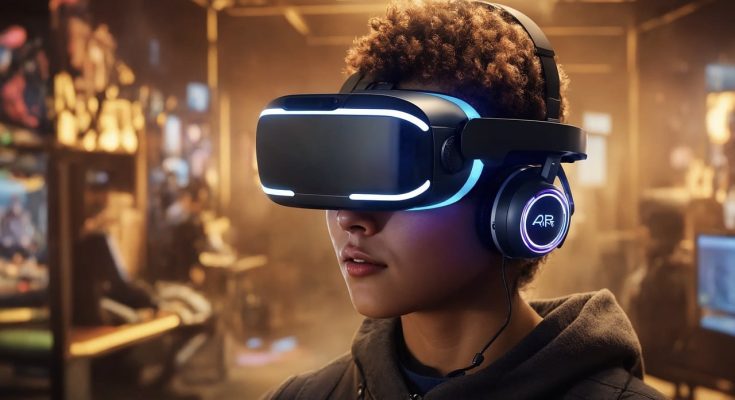Revolutionizing Gameplay: The Impact of VR in Gaming
Virtual Reality (VR) gaming has emerged as a revolutionary force in the gaming industry, promising immersive experiences and transforming how players interact with virtual worlds. This article explores the evolution of VR gaming, its impact on gameplay, challenges, and the future trajectory of this transformative technology.
Introduction to VR Gaming
Virtual Reality gaming involves using headsets and motion-tracking technology to create immersive virtual environments. Players are transported into digital worlds where they can interact with objects, environments, and other players in unimaginable ways.
The Evolution of Virtual Reality
Early VR Attempts
The concept of VR dates back to the 1960s, with early attempts to create immersive experiences through primitive headsets and simulations. However, technological limitations hindered widespread adoption until recent years.
Advancements in VR Technology
Virtual reality has entered the mainstream thanks to recent developments in hardware and software. High-resolution displays, precise motion tracking, and intuitive controllers have significantly enhanced the immersive capabilities of VR systems.
The Emergence of VR Gaming
Key Players in the VR Gaming Industry
Several companies, including Oculus (owned by Meta), HTC Vive, and Sony PlayStation, have invested heavily in VR gaming technology. These companies have developed cutting-edge hardware and software to drive the growth of the VR gaming market.
Popular VR Gaming Platforms
Platforms like Oculus Rift, HTC Vive, and PlayStation VR have garnered a dedicated user base, offering diverse gaming experiences. From immersive storytelling to adrenaline-pumping action, VR gaming has something for every type of gamer.
Revolutionizing Gameplay with VR
Immersive Experiences
VR gaming transports players into virtual worlds with unprecedented realism. Whether exploring ancient ruins, battling space invaders, or participating in competitive sports, VR offers immersive experiences that blur the lines between reality and fantasy.
Enhanced Interaction
One of the key advantages of VR gaming is its ability to provide intuitive and responsive interaction. Players can manipulate objects, wield weapons, and engage in complex maneuvers with natural movements, adding a new dimension to gameplay.
Social Connectivity
VR gaming also fosters social connectivity, allowing players to interact with friends and strangers in virtual environments. From multiplayer battles to virtual meetups, VR enables social experiences that transcend physical boundaries.
Challenges and Limitations
Technical Constraints
Despite its potential, VR gaming still faces technical challenges such as motion sickness, hardware limitations, and compatibility issues. Achieving seamless performance across different platforms remains a significant hurdle for developers.
Health Concerns
Extended use of VR headsets may lead to discomfort, fatigue, and eye strain. Moreover, concerns about the long-term effects of immersive VR experiences on mental health and cognitive development have prompted calls for further research and regulation.
The Future of VR Gaming
Technological Innovations
The future of VR gaming holds promise for even more immersive and realistic experiences. Advancements in haptic feedback, eye-tracking, and artificial intelligence are poised to revolutionize how players engage with virtual worlds.
Expanding Accessibility
As VR technology becomes more affordable and accessible, its reach is expected to expand beyond traditional gaming audiences. Educational institutions, healthcare providers, and businesses are exploring VR applications for training, therapy, and collaboration.
Conclusion
In conclusion, VR gaming has the potential to revolutionize gameplay by offering immersive experiences, enhanced interaction, and social connectivity. Despite challenges and limitations, the future of VR gaming looks promising, with continued advancements driving innovation and expanding accessibility.
FAQs
- What hardware do I need to experience VR gaming?
- VR gaming requires a compatible headset (such as Oculus Rift, HTC Vive, or PlayStation VR) and a powerful gaming PC or console.
- Is VR gaming suitable for all ages?
- While VR gaming can be enjoyed by players of all ages, prolonged use may not be suitable for young children or individuals prone to motion sickness.
- Do virtual reality games pose any health risks?
- Extended use of VR headsets may cause discomfort, fatigue, and eye strain. It’s essential to take breaks and use VR responsibly.
- Can I play traditional games in VR?
- Some traditional games have been adapted for VR, while others are specifically designed for VR platforms. Check the compatibility of your favorite games with VR systems.
- What is the future of VR gaming?
- The future of VR gaming holds exciting possibilities, including more immersive experiences, advanced technologies, and broader applications beyond entertainment.



